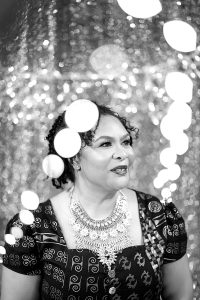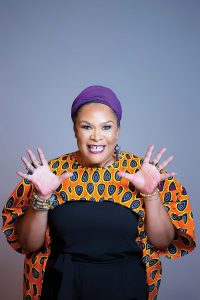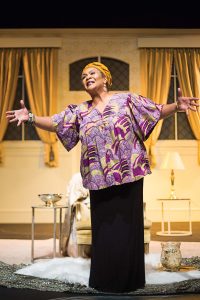Her voice reminds us why the american experiment works. Her tone possesses a firmness and sense of authority while still somehow being gentle and reassuring. Sitting there in the U.S. Capitol Visitor Center, the film’s audience, a true melting pot of tourists from every imaginable age, nationality and ethnicity, listens intently to her narration of the short documentary E Pluribus Unum – Out of Many, One, which roughly 5 million visitors experience every year as they tour the U.S. Capitol Building in Washington, D.C.
The sound of her voice touches something deeply personal in all listeners – perhaps their sense of pride, their sense of belonging, their sense that the American dream can unlock any and all possibilities. Hands surreptitiously dab at moist eyes. Small coughs clear throats constricted by emotion. Some even clap as the film finishes. It is nearly impossible to listen to her voice and not be moved … to not be moved deeply.
That is the power of the human voice. That is the power of her voice. And that is the power of Joy Vandervort-Cobb.
Make a Joyful Noise
Today, Joy Vandervort-Cobb, an associate professor of theatre, laughs about her audition for her voiceover work for that introductory film at the U.S. Capitol. Voiceover work wasn’t something she had ever really thought about. In fact, she didn’t really have time for it – between the teaching, grading, directing, writing and performing she is constantly juggling. However, as a favor to a friend in New York, she was willing to give it a try. Sure, why not? she thought. I’m in the city anyway. What harm could it do?
Of course, the favor was quickly forgotten as Vandervort-Cobb met up with old theater friends in New York City and did what you do in the Big Apple – explore old haunts and stay up all hours in the city that never sleeps. When her mobile phone rang the next morning – way too early, she recalls – she told the voice on the other end of the line who was calling to schedule her that she was too busy that day to come in for any audition. Since it’s voiceover work, could I not just do it over the phone? she asked, somewhat dismissively.
Well, the unnerved production executive explained, doing the audition by phone will put you at a disadvantage. But, if that’s the only way to do it, well ….
That’ll work, baby, she fired back, ending the call as quickly as she could.
When it came time for the “tele-audition,” Vandervort-Cobb did what she does best. She cleared her mind, focused her attention and inhabited a role. To the awestruck executives on the other end of the line, the words in the script seemed somehow charged with an added depth through her intonation and delivery. To them, she was the one. And a voiceover star was born on that telephone call.
Since that initial audition about a decade ago, Vandervort-Cobb has entered the world of voiceover work and attacked it with gusto (those who know her will tell you that she does everything with gusto; that’s the only way she does anything, of course). Her portfolio of work is as eclectic and as wide-ranging as her incredible actor’s résumé, with her voice providing the narration for films about the American Revolution in Philadelphia, the battle at Gettysburg, tourism in Alabama, conservation in Montana, among many other topics and locales across the country.
“Joy has this ability peculiar to those with an acting and theater background,” notes Donna Lawrence, president of Donna Lawrence Productions, based in Louisville, Ky., and a longtime collaborator with Vandervort-Cobb. “She has the most evocative, authentic sounds with her narration. She is completely there, if you know what I mean. She just captivates people – and not in a melodramatic, obvious kind of way. She does it in subtle ways. You just seem to see her and feel her. No matter what, you are in the story with Joy.”
And perhaps there is no story today as large as the American presidency. In December 2017, Disney unveiled its updated celebration of American leadership in the Hall of Presidents at Disney World in Orlando, Fla., its audio-animatronics showcase of every president in U.S. history, from Washington to Trump. Ignore the spoofs and parodies from the likes of Stephen Colbert and The Simpsons; the robot-enhanced performance, while perhaps not as popular as the rollercoasters Space Mountain or Expedition Everest, is still seen by many of the 21 million annual visitors to the park. And more important, as narrator of The Idea of a President – the latest iteration of the 49-year-running show – Vandervort-Cobb joins the ranks of some of the most well-known voices in the world who have provided their vocal talents to earlier versions of the show: Morgan Freeman, J.D. Hall and Maya Angelou.
Not bad company for a kid out of little Newburgh, New York.
Joy to the World
Growing up just 60 miles north of New York City, Vandervort-Cobb fell in love with the theater and acting at an early age. By fourth grade, she knew she was meant for the stage. But it wasn’t just the bright lights of Broadway that captured her imagination. She saw the power of acting on a very personal and intimate level.
Her grandmother was not one to waste laughter. You know the type: not exactly stoic, but not the life of the party either – a woman of her era who chose her words carefully and shared her emotions sparingly. However, when her grandmother watched Lucille Ball on television, her entire face brightened: “I remember watching I Love Lucy with her and saw how it made her feel. I saw what acting could do to lift someone’s spirits.”
But it wasn’t just for the laughs that she fell in love with acting. Vandervort-Cobb took note of how her family would gather, without fail, to watch Julia each weeknight. Julia, which starred Diahann Carroll, was an American sitcom in the late ’60s and early ’70s that some television historians cite as the first program to show an African American actor in a nonstereotypical role.
“Yes, I think Lucille Ball made me want to make people laugh,” Vandervort-Cobb observes, “but it was Diahann Carroll that made me realize that there was space for me, as an African American woman, to do it. And to do it in a really powerful way.”
In the late ’70s, Vandervort-Cobb did what so many aspiring actors do: go to Hollywood to chase their dreams. Out west, she entered college at just 16 years old and later earned her B.F.A. in theater from the University of Southern California, seeing up close the cutthroat world of the entertainment industry in Los Angeles. So, with a degree in hand and the newfound knowledge of a Tinsel Town dismissive of theater (in her estimation), she packed up her bags and headed back to New York, living in Brooklyn (when it was way more affordable, she points out). From there, she began a career of acting and directing, finding gigs up and down the East Coast, everything from the national tour of Dreamgirls to Ma Rainey’s Black Bottom in Baton Rouge’s Swine Palace.
By the mid-’90s, Vandervort-Cobb and her family had settled in Charleston and she was in between acting gigs and looking for some guest-directing opportunities at the College. Impressed with her acting chops and theater pedigree, former theatre chair Allen Lyndrup of the Department of Theatre (now the Department of Theatre and Dance) asked her to join the faculty as an adjunct instructor in 1995, teaching an Introduction to Theatre course and an African American theatre course.
“To be honest, I didn’t even know what an adjunct was. I assumed he meant a faculty position. I also didn’t know diddlysquat about African American theater,” Vandervort-Cobb admits. “So, after accepting the position, I sat in my house late at night just reading every African American play I could put my hands on. And, remember, this was before the internet, so it wasn’t just a click of the mouse. I even borrowed a syllabus from a theatre colleague for my first intro class. I tried to follow it – the assignments, the reading – but as the semester wore on, I saw how the students just tuned me out and weren’t getting into the material. I learned very quickly that I needed to do things my way. I needed to engage them.”
As most everyone knows, good teaching is more than just passing along facts from a textbook. The art of teaching combines superb analysis and scholarship with a bit of performance. And very few can deliver a performance like Vandervort-Cobb can, whether on the stage or in the classroom.
 A Joy to Behold
A Joy to Behold
You can’t hide in Joy Vandervort-Cobb’s class. She notices everything. Staring at your laptop computer screen too long? She’ll call you out – no porn in my class, please. Starting to nod off? She’ll drift over your way and force you to wake up with a boom in her voice. Fortunately, she only employs these techniques sparingly.
“I follow playwright George C. Wolfe’s theater philosophy in my classroom: tickle with one hand and stab with the other,” she laughs. “I want students talking and thinking about the works we are exploring. Because if they are thinking and talking, they are fully engaged.”
“Joy does an incredible job of creating conversations,” says Janine McCabe ’98, a former student as well as the current chair of the department. “Joy is the professor that ends the class only because time has run out, but the conversation continues, even as she walks to her car. I had Acting I with her as a student. I wasn’t an actor. Performance was intimidating to me. But Joy really helped me come out of my shell, making me feel like I could do the work. Even though I wasn’t going to be an actor, like many of the students in the class, she taught me awareness of my body and my voice – skills that can and will help in
any profession.”
For Michael Smallwood ’09, Vandervort-Cobb was more than just a teacher or an academic advisor, she was – and still is – a true mentor.
“If you’re one of her students, it seems like you have more of a parent-child relationship with her,” Smallwood observes. “She treats you like one of her own. And that means she doesn’t sugarcoat things for you. There’s a sense that she understands who you really are and where you’ve been, like your mom knows. And like your mom, she can give you advice that cuts through all of the nonsense. She doesn’t coddle necessarily, but she is someone who makes you feel loved, cared for – safe even. Her advice is always honest, truthful. She sees to the heart of things because she has so much experience. She knows because she has been there herself.”
Smallwood, like so many other students, uses that term “mom” or “mama” intentionally whenever talking about Vandervort-Cobb. Because she is known, far and wide, simply as “Mama Joy” or just “Mama” to so many students and alumni (many of whom never even had her in class).
“Yes, for some reason, I’ve always been called Mama or Mother, even before I came to the College,” says Vandervort-Cobb. “On the road, when I was working professionally, everyone called me ‘Mother.’ It started early, I guess. I’m a bit of a mama bear, even when you don’t want me to be. It’s just part of who I am. At the College, ‘Mama’ or ‘Mama Joy’ came about pretty naturally. I think it’s my quick ability to stand up for students – or ensure that the students are going to stand up for themselves, whether they like it or not.”
And “Mama Joy” has been standing there with many of her former students as well – at the wedding altar. When Smallwood and Jillian Clayton ’10 decided to get married, the couple knew they wanted Mama Joy to lead the proceedings. So, they asked, cajoled, pleaded and Vandervort-Cobb went online to become licensed. Since then, she has gone on to officiate more than a dozen weddings of former students. “Michael and Jillian created a little cottage industry for me,” she laughs. “But in all seriousness, I am truly honored to even be asked. It’s a truly amazing moment to share with them.”
Because, by that point, Vandervort-Cobb has seen the labors of her teaching bear fruit. Awash in emotion and memory, she sees capable, confident, cultured men and women ready to tackle the future with optimism and a special spark in their eyes. She sees them, but, more importantly, she hears them – she hears them mastering the sound of their own voices.
And that is the one lesson she hopes to instill in everyone she has the honor to teach: “Your voice is your own. And, yes, baby, it is powerful.”







